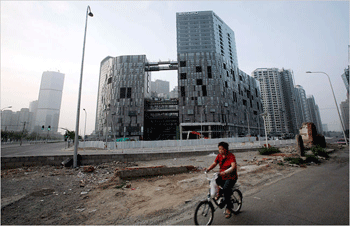Following China’s clampdown on traditional funding for speculative real estate ventures, developers facing a financing gap estimated at US$111 billion are setting up their own funds in an effort to keep afloat.
About $2.2 billion of syndicated property loans and club deals will become due this year, according to data from Thomson Reuters, while a further RMB 117 billion ($18.6 billion) needs to be found to repay maturing real estate trusts.
Add in the other credit lines that need repaying and developers need to find over RMB 700 billion this year, according to Hua Xia Times, a Chinese business newspaper in Beijing.
According to a recent story in Reuters, the developers aim to raise this cash by pitching their new investment vehicles directly to China’s wealthy families.
Major developers such as China Overseas Land & Investment, Gemdale Corp, and Forte, are among the first firms to have launched their own funds. Others including China Vanke, the country’s biggest listed property firm by sales, chose to set up funds jointly with their peers to help each other survive tough times.
“We must make more friends and widen our financing sources. That will help our future growth,” Zhu Tong, chairman of Sun Real Estate, a mid-sized developer in Beijing, told an industry forum in Beijing last week.
On the upside, China’s high net-wealth families still favor property investment and funds give them an alternative to buying the physical asset while retaining exposure to the sector.
A total of 29 property funds raised $4.1 billion in 2011, a big improvement on the $2.9 billion raised by 28 vehicles in 2010, according to consultancy Zero2IPO.
Industry analysts expect more than $6 billion will be raised in 2012 and that the property fund market will expand at an annual rate of 40-50 percent over the next few years.
The funds are targetting China’s wealthy families and require a minimum investment of RMB 10 million while projecting annual returns of at 25 percent according to a recent industry report.
The balance sheets of many Chinese developers deteriorated in 2011. Greentown China , a major player in eastern China, is now struggling to survive and having to sell assets to do so.
According to many reports, developers digging into internal reserves for working capital. Internal funding, including new property funds raised, was 41 percent of total financing in the industry in the first 11 months of 2011, up from 38 percent and 33 percent in the same period of 2010 and 2009 respectively, according to the National Bureau of Statistics.
Whether or not the funds can be established (and sold) quickly enough to bail out highly leveraged developers such as Greentown remains to be seen. Most likely many small or medium sized developers will be selling distressed assets to their better-backed brethren this year, but the real estate fund sector should be playing a larger role as well.

[…] by SOHO, and subsequently denounced by Fosun, SOHO has allegedly agreed with Shanghai Zendai and cash-strapped Greentown China to acquire their combined 50 percent stake in a 45,000 square metre commercial property south of […]